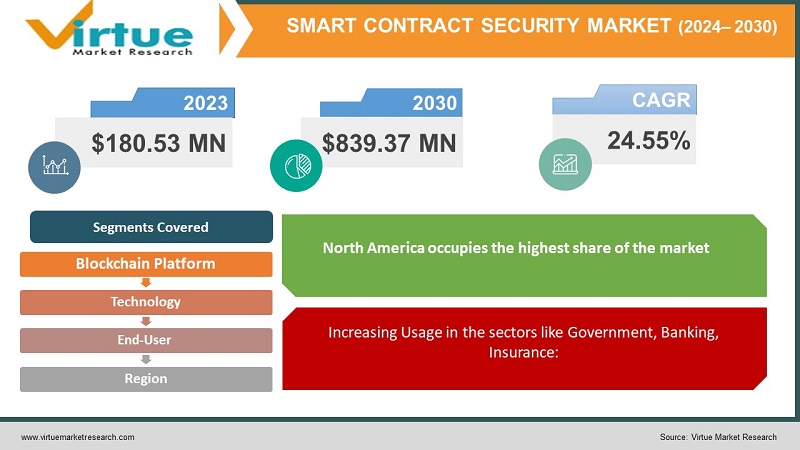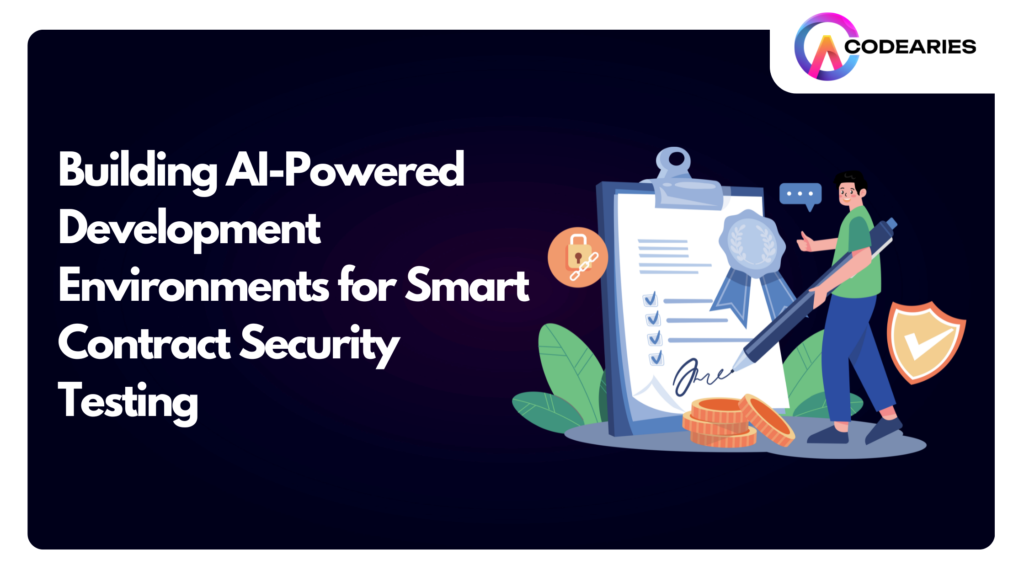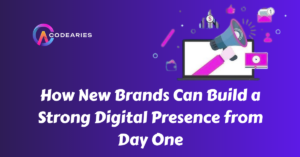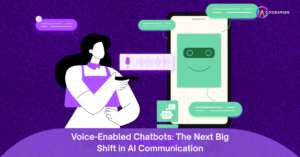As blockchain technology advances, so does the complexity of ensuring that smart contracts—the backbone of decentralized applications—remain secure. These self-executing contracts, embedded with pre-determined rules, offer unparalleled advantages in trustless environments, yet their inherent risks demand robust security measures. With AI-powered development environments stepping onto the scene, smart contract security testing is undergoing a transformative shift. Leveraging artificial intelligence enables developers to identify vulnerabilities more efficiently and fortify smart contracts against an evolving landscape of cyber threats.
In this article, we explore the power of AI in smart contract development environments, the specific challenges it addresses, and the benefits it brings to the future of blockchain security.
What is an AI-Powered Development Environment?
An AI-enhanced Integrated Development Environment (IDE) revolutionizes software development. It uses artificial intelligence to streamline the coding process. These advanced platforms leverage machine learning algorithms to automate routine tasks. They also propose code improvements and assist with debugging and problem-solving.
Key Features and Advantages of AI-Enhanced IDEs
- Contextual Code Completion: AI-driven IDEs offer code completion suggestions based on the context, providing developers with relevant code snippets or entire lines, accelerating coding and minimizing errors.
- Smart Code Recommendations: AI can analyze coding patterns to propose improvements such as refactoring opportunities or performance optimizations, helping maintain cleaner and more efficient code.
- Error Detection and Resolution: AI tools can pinpoint potential bugs or issues within the code and offer corrective suggestions, facilitating the creation of more reliable and error-free software.
- Natural Language Interaction: Developers can use natural language to query the IDE, obtaining helpful information or code examples without navigating complex documentation.
- Automated Testing Procedures: AI can generate test cases or oversee automated testing processes, ensuring thorough validation and enhancing code quality.
- Seamless Version Control: AI enhances integration with version control systems. It can suggest meaningful commits and help resolve conflicts, simplifying version management.
Notable Examples of AI-Enhanced IDEs
- Visual Studio Code: Microsoft’s widely used code editor integrates various AI-powered features, including intelligent code completion (IntelliSense) and streamlined Git integration.
- JetBrains IDEs: JetBrains offers a range of IDEs tailored for different programming languages, each with advanced AI-driven functionalities.
- Google Cloud Code: This cloud-based IDE provides intelligent coding support, debugging tools, and deployment features, enhancing the overall development workflow.
Incorporating AI into development environments boosts efficiency, productivity, and accessibility, making it easier for developers at all levels to produce high-quality software.
Understanding Smart Contracts
Smart contracts are self-executing and automated, operating on blockchain networks. The blockchain directly encodes the terms of these contracts, ensuring transparency, immutability, and security against tampering.Once the predefined conditions of a smart contract are met, the contract automatically triggers the appropriate action, such as transferring funds or verifying a transaction.
Despite their apparent security, smart contracts are susceptible to bugs or vulnerabilities in the underlying code. Since blockchain contracts are immutable—meaning once they are deployed, they cannot be modified—developers must ensure that every aspect of the contract is thoroughly tested and secure before deployment. In 2023, the Global Smart Contract Security Market was valued at $180.53 million, and is projected to reach a market size of $839.37 million by 2030. Over the forecast period of 2024-2030, market is projected to grow at a CAGR of 24.55%.
Importance of Smart Contract Security
Smart contracts, especially those in high-stakes sectors like decentralized finance (DeFi), handle significant sums of money. A single exploit in a widely-used contract could lead to substantial financial losses, as seen in various DeFi hacks and breaches. Therefore, ensuring the security of these contracts is paramount.Blockchain’s immutability, which is usually a strength, becomes a critical weakness if a vulnerable smart contract is deployed. In such cases, malicious actors can exploit these vulnerabilities without the ability to undo the damage or patch the contract. As a result, security testing must be exhaustive, identifying and addressing even the most minor flaws. This is where AI-powered environments make a substantial impact.
Common Vulnerabilities in Smart Contracts
Several vulnerabilities can compromise smart contracts. Developers need to be vigilant about common issues such as:
- Reentrancy Attacks occur when a contract calls an external contract, and the external contract calls back into the original one before the first call is completed. This can lead to unintended behaviour and security breaches.
- Integer Overflow/Underflow bugs occur when calculations exceed the allocated space for a number, resulting in incorrect outputs or behaviour.
- Unauthorized Access: Flaws in access control logic can allow attackers to execute functions that are meant to be restricted.
- Denial of Service (DoS): A contract can be rendered unusable if an attacker exploits its logic to prevent legitimate users from interacting.
AI-powered tools are particularly adept at detecting such vulnerabilities by recognizing patterns in the code that may lead to these types of attacks.
How AI Improves Smart Contract Security
AI-driven tools enhance smart contract security testing by automating several key processes:
Static Code Analysis
AI algorithms analyze the codebase for known vulnerabilities by scanning the contract’s logic without executing it. This analysis identifies security risks such as incorrect access controls or reentrancy issues before the contract is deployed.
Machine Learning Models
By studying a vast dataset of previous smart contracts and their vulnerabilities, machine learning algorithms learn to identify previously unseen patterns that might indicate security flaws.
Fuzz Testing
AI enhances fuzz testing, where random inputs are fed into the contract to test for weaknesses in how the contract processes data. This helps uncover bugs that might not be evident during manual testing.
Natural Language Processing (NLP)
Some smart contracts involve human-readable components, such as comments or documentation. NLP helps AI analyze these elements for inconsistencies that indicate misunderstood logic or incomplete requirements.
Benefits of AI in Development Workflows
Integrating AI into smart contract development workflows offers several advantages, including:
- Efficiency: Automated processes save developers time and resources, allowing faster testing and iteration.
- Accuracy: AI tools can detect subtle issues humans might overlook, leading to more comprehensive security coverage.
- Scalability: AI-powered environments can handle large-scale smart contract testing across multiple blockchain platforms, ensuring consistent security protocols .
- Proactive Defense: Instead of waiting for vulnerabilities to be exploited, AI detects and fixes potential issues during the development phase.
Key Features of AI-Powered Development Tools
AI-powered development environments come equipped with a variety of features tailored to enhance the security of smart contracts:
- Anomaly Detection: AI systems continuously monitor code for anomalies, ensuring that even minor deviations from secure coding practices are flagged.
- Automation: Routine tasks such as code audits, vulnerability scanning, and report generation are automated, allowing developers to focus on more strategic tasks.
- Predictive Analytics: By analyzing historical data and patterns, AI tools predict where future vulnerabilities might emerge, allowing developers to address them preemptively.
AI for Enhanced Smart Contract Security and Efficiency
Artificial Intelligence has become a crucial asset for boosting the security and efficiency of smart contracts. By automating tasks and providing sophisticated insights, AI helps developers build more secure, reliable, cost-effective smart contracts.
Key Applications of AI in Smart Contract Management:
Automated Vulnerability Detection
- Proactive Identification: AI-driven tools continuously scan smart contract code to identify vulnerabilities such as reentrancy attacks, integer overflows, and denial-of-service (DoS) conditions.
- Early Detection: By addressing potential issues before they can be exploited, AI reduces the risk of financial loss and damage to reputation.
Integration with Existing Development Environments
- Seamless Integration: AI tools smoothly integrate into existing development environments using APIs or plugins, enhancing security without disrupting current workflows.
- Enhanced Efficiency: This integration embeds security measures throughout the development lifecycle, streamlining the process and maintaining a focus on security.
Continuous Monitoring and Auditing
- Real-Time Surveillance: AI continuously monitors deployed smart contracts, detecting anomalies, suspicious activities, and emerging vulnerabilities.
- Adaptive Security: Continuous oversight allows for rapid responses to new threats, ensuring that smart contracts remain secure.
Gas Optimization
- Cost Efficiency: AI analyzes smart contract code to find opportunities for optimizing gas usage, which helps reduce transaction costs associated with blockchain operations.
- Performance Enhancement: By lowering gas consumption, AI improves smart contracts’ overall efficiency and effectiveness.
AI-Enhanced Tools for Smart Contract Auditing
AI-driven tools are revolutionizing the field of smart contract security by automating the auditing process, detecting vulnerabilities, and offering insights for improvements. Here’s a look at some notable AI-enhanced tools for smart contract auditing:
Mythril
- Static Code Analysis: Mythril performs static analysis on Solidity, Vyper, and EVM bytecode to identify potential security issues.
- Machine Learning Integration: By leveraging machine learning, Mythril enhances its detection capabilities, refining its ability to spot vulnerabilities more accurately over time.
Slither
- Modular Framework: Slither provides a flexible framework for analyzing Solidity code, allowing developers to extend it with custom plugins and additional analysis methods.
- AI Integration: Slither’s architecture supports integration with AI tools, amplifying its analysis and detection capabilities.
Securify
- Hybrid Detection Methods: Securify combines static analysis, symbolic execution, and taint analysis to uncover vulnerabilities.
- AI-Enhanced Recommendations: It provides AI-driven insights for remediating identified vulnerabilities and improving the overall security posture.
Conclusion
As smart contracts become crucial in decentralized systems, securing them is vital. AI-powered development environments are revolutionizing this process. They provide advanced tools to detect vulnerabilities, automate testing, and optimize code. The future of blockchain security depends on widespread AI adoption. This will lead to a safer and more reliable environment for decentralized financial systems.
Choose the Right AI-Powered Tools for Smart Contract Security With Codearies
Choosing the right AI-powered tools for smart contract security starts with assessing your specific needs, including the type and complexity of the smart contract. Evaluate tools that match these needs. Ensure these tools integrate seamlessly with your development environment using APIs or plugins. Also, check their compatibility with your technology stack. Review the tool’s reputation through user feedback and consider the cost relative to the value it offers. For tailored advice and recommendations, book a free consultation with Codearies, where our experts can help you select the most effective AI-powered solutions for your smart contract projects. For more information, contact us at contact@codearies.com or visit our services, portfolio, and latest blogs.
FAQS
What is an AI Smart Contract?
An AI smart contract is self-executing with terms directly written into code, enhanced by artificial intelligence. AI can optimize smart contracts by predicting potential risks. It automates complex decision-making processes. Additionally, AI improves accuracy in contract execution using advanced algorithms. Machine learning further enhances these capabilities.
How does AI transform contract management?
AI enhances contract management by automating routine tasks such as contract drafting, review, and compliance monitoring. It can analyze extensive volumes of contract data to identify trends, manage deadlines, and ensure adherence to contractual obligations, improving efficiency and reducing manual errors.
Can Smart Contracts Be Automated?
Yes, smart contracts are inherently automated. They execute predefined actions based on fulfilling specified conditions without human intervention. Automation in smart contracts is driven by the contract’s code, which autonomously enforces terms and executes transactions when conditions are met.







